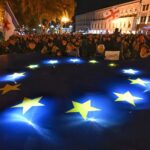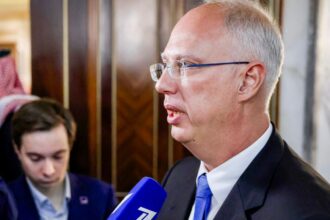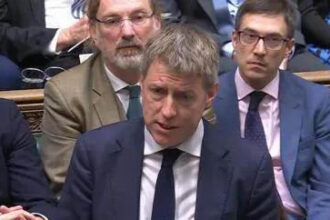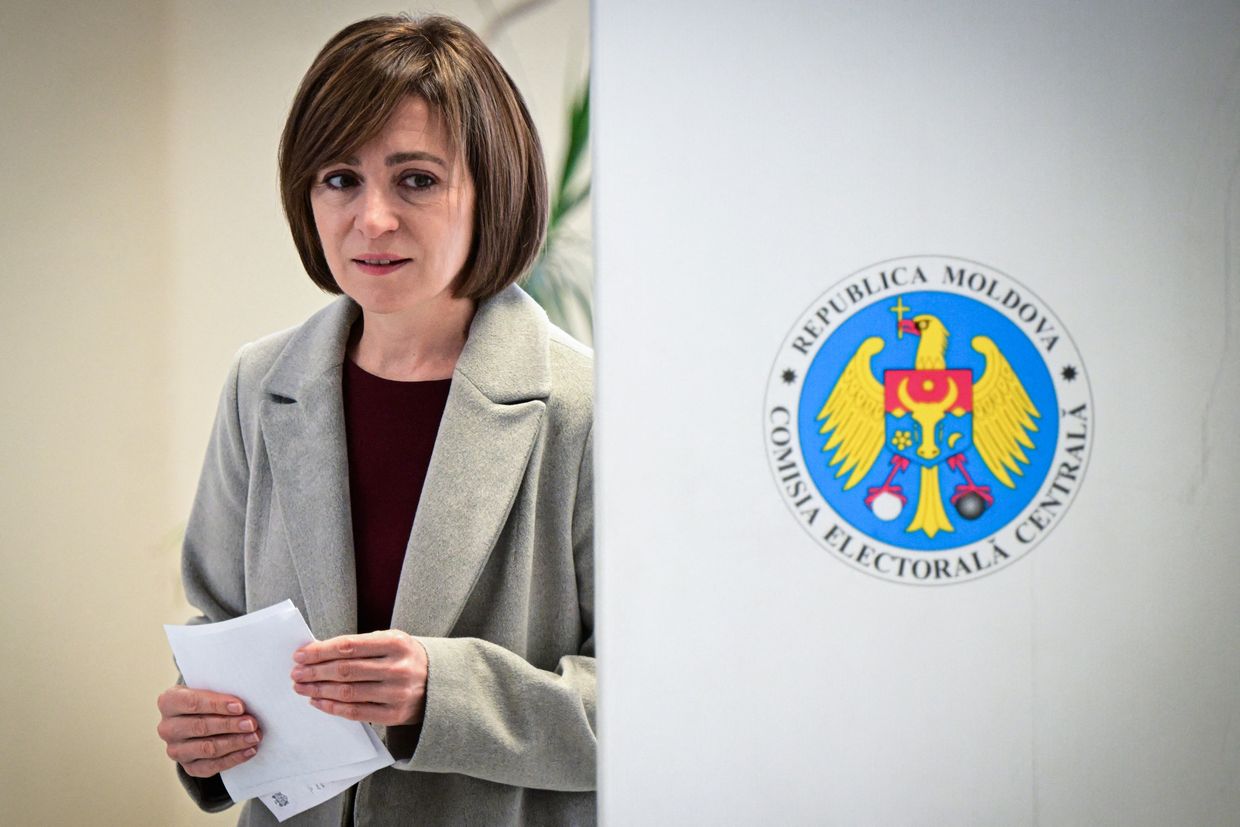Two women vote in the presidential election and referendum on the European Union on October 20, 2024, at a polling place in the village Hirbovat (Moldova). (Daniel Mihailescu / AFP via Getty Images)
The election and referendum results of Sunday shocked many pro European Moldovans, despite the fact that Russian interference in Moldova has taken many forms since its independence in 1992.
Despite clear support in opinion polls for enshrining the desire for EU membership into the country’s Constitution, the success of this EU referendum was determined by the support of a large Moldovan diaspora, which secured a 50.38% margin of victory.
The “yes” votes won by only 11,000 votes.
The EU, U.S. officials and independent observers all blamed a criminal network and political groups linked to Russia for the unprecedented attack on the country’s democracy.
Two weeks before the referendum, the Moldovan police and anti-corruption agency said that they had evidence of 130,000 people taking bribes to Russian-linked forces to try to overturn the results of the referendum. In a press conference at 1AM, Moldovan president Maia Sandu stated that, according her information, those who planned to disrupt the referendum had been incentivized by Russian-linked forces to buy up to 300.000 votes.
If true, this would represent approximately 20% of the 1,5 million ballots cast in Oct. 20.
Police said that Ilan Shor, a fugitive oligarch, transferred $39 million in total to buy votes between September and October. Shor, despite his being on the run and maintaining some political support, denies any wrongdoing.
Investigative reports by Ziarul de Garda (Zona de Security) and Ziarul de Garda (Zona de Garda) confirmed that the scheme involved Telegram groups, the Russian state-owned Promsvyazbank, and its branches located in the country’s eastern Russian influenced breakaway region Transnistria.
“Simple mathematic calculations confirm what the authorities said: Yes, there was massive Electoral Fraud,” said Tatiana Cojocari a sociologist at Watchdog, one think tank that commissioned polls for Moldova.
“People who otherwise would not have cast their votes were bought.” She added that “just as media investigations revealed, we had a mass bribe driven mobilization for the “no” vote in the referendum.”
Get ready for the next round
After the referendum, all attention is now focused on the presidential runoff election, scheduled for Nov. 3.
Sandu, a pro-EU president, will run against former Prosecutor general Alexandr Stoianoglo. Stoianoglo was dismissed by Sandu for alleged corruption.
Stoianoglo scored 26 % in the first round. This is significantly more than the 9-11% predicted by opinion polls.
Stoianoglo is also a dual Moldovan-Romanian national and, like Sandu publicly supports the EU accession of his country. However, the former prosecutor receives support from the pro-Kremlin Party of Socialists.
He also opposed the referendum and dismissed it as serving Sandu’s interests rather than the EU Integration process.
The press was leaked screenshots of Telegram groups stating that the vote-buying network controlled by the fugitive oligarch Shor who now lives in Moscow was asked to vote Stoianoglo.
Both Shor and Stoianoglo have denied any involvement in bribery plans.
Igor Botan from the think-tank ADEPT told Kyiv Independent that criminal networks have proven to be stronger technologically than state institutions.
To ensure fairness in the elections on November 3 and next summer, the government will need to block Russian bank transactions and the use cryptocurrency in Moldova. This is how Russian money is funneled.
Botan said that if they didn’t have the capability to do it they should ask for help from EU partners.
According to Victor Ciobanu of the analyst Victor Ciobanu’s, the election results showed that a protest vote was cast. This should be a wake-up call for Sandu’s pro-European Government.
Since the war in Ukraine has increased by 40%, salaries and pensions in Moldova have not kept up. Many blame the government for the rising prices and are frustrated with the slow pace of anti-corruption reforms and judiciary reforms.
Ciobanu stated that “the government can and should only be changed as a result normal, fair and honest elections.”
He said that the “dirty” money and “lies” present in Orhei, Gagauzia and now on a national level, cannot be considered elections.
Ciobanu claims that if the process of corrupting democracy’s foundations is not stopped in 2025 after the parliamentary elections, Moldovans may end up with a “captured mafia-state” once more.
“And the Kremlin gets a pro-Russian Government in Moldova without firing a single shot and the opportunity to open up a second front (against Ukraine),” Ciobanu continued.
Ileana Raceru, a political scientist, agrees that if Moscow controls government, Russia can use Chisinau Airport to transport military aid via Istanbul or Yerevan.
“If pro-Russians are elected, I don’t believe Russia will give money to keep Moldova afloat and to alleviate chronic poverty. They will need money and will (eventually) delay the process, both to please Russia and take care of their business and corruption schemes. Racheru said that they didn’t know whether Russia would be pleased with the situation.
She added, “They could ask for assistance in Ukraine.”
Botan, on the other hand, said that such scenarios where a Russia friendly government takes over Moldova are unpredictable. “For Ukraine, it wouldn’t be a problem if they had enough resources to neutralize a threat coming from Moldova.”
He is more worried about the impact of such a result on Moldova, which could include a “catastrophic exit of young people.”
Read More @ kyivindependent.com













